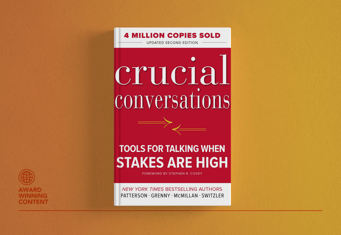HOW TO SPEAK UP DURING COVID-19: |
5 common work scenarios that you may experience |
with Crucial Conversations Master Trainer, Nicole Samuels |
While COVID-19 has intensified our social interactions and perhaps left us with strained relationships and poor outcomes, it is still possible to achieve dialogue. These Crucial Conversations tips will give you the confidence and words to speak up when it matters most.
"Safe behaviour won’t become expected behaviour until millions of us, kindly remind those who don’t practice it.” - Joseph Grenny, the author of Crucial Conversations.
Jump to each scenario:
- Scenario 1 - Not wearing masks in the office
- Scenario 2 - Someone called me out!
- Scenario 3 - Too many people in a meeting room
- Scenario 4 - Not up to par
- Scenario 5 - Repeated offense
- Contact Biz Group to find out more about Crucial Conversations
SCENARIO #1 - Not wearing masks
PROBLEM: You’re anxious about being back in the office because not everyone is wearing their mask or social distancing.
YOUR OPTIONS:
a) Say something and end up in an argument
b) Say nothing and risk exposure to the virus
THE FACTS*:
1) 33% of workers don’t feel it’s their place to tell others how to behave
2) 29% don’t feel they are an authority on the matter
3) 27% unsure on exactly what to say
SOLUTION: Focus on being safe not just for yourself but for the entire organisation. The key to finding the courage to speak up is to check your motive. When your intention is to be kind, your words feel different.
MASTER TIP: “It’s kind to remind.” (Joseph Grenner – Author, Crucial Conversations)
SCENARIO #2 - Someone called me out!
PROBLEM: At the office, you were not wearing your mask because it’s hot and uncomfortable and your colleague called you out on this. You feel embarrassed.
YOUR OPTIONS:
a) Tell her that she doesn’t always wear hers and end up in an argument
b) Say nothing; resent her for making you feel like your mama just scolded you
THE FACTS*:
1) 31% of workers worry that speaking up won’t do any good
2) 33% don’t know how to speak up that won’t feel offensive
3) 27% unsure on exactly what to say
SOLUTION: Ask yourself: what am I pretending not to notice about my role in the problem? What should I do to move toward an amicable solution? Say thank you, put your mask on and be responsible.
MASTER TIP: “When someone is kind to remind, give them gratitude, not attitude.” (Joseph Grenner – Author, Crucial Conversations)
SCENARIO #3 - Too many people in this meeting room!
PROBLEM: You’ve noticed that more colleagues are becoming lax and not adhering to the COVID office protocols. The meeting room should have no more than 5 attendees and now 2 others have just joined the meeting. How do you handle this?
YOUR OPTIONS:
a) Tell them they are not worth dying for, storm out of the room
b) Say nothing; try not to take deep breaths and pray you’ll be fine
THE FACTS*:
1) 33% of workers don’t feel its their place to tell others how to behave
2) 29% don’t feel they are an authority on the matter
3) 33% don’t know how to speak up that won’t feel offensive
SOLUTION: Recognise that you are the authority on your personal health and safety. Don’t overthink how others might react, that’s on them. Have an automatic phrase like: “We’ve been asked to have only five in the conference room.” Take control of your actions and feel good for doing the right thing.
MASTER TIP: “Speak up and let go.” (Joseph Grenner – Author, Crucial Conversations)
SCENARIO #4 - Not up to par
PROBLEM: Your team member’s last two reports are unsatisfactory but you are empathetic given the pandemic stress. How do you handle this without coming across as the insensitive boss?
YOUR OPTIONS:
a) Tell him he needs to get his act together or else…
b) Say nothing and hope that he gets back on track soon
THE FACTS*:
1) 28% workers unsure on exactly what to say
2) 31% worry that speaking up won’t do any good
3) 33% don’t know how to speak up that won’t feel offensive
SOLUTION: Start with the intention of finding out the truth of person’s reality, in that way you are showing empathy and compassion. Describe what you have observed and ask helpful questions, like: What’s your view? Can you help me understand? Focus on getting results through relationship building.
MASTER TIP: “Be curious, not furious.” (Joseph Grenner – Author, Crucial Conversations)
SCENARIO #5 - Repeated offense
PROBLEM: You are now frustrated because on two prior occasions you spoke to the same person about not following the COVID office protocols. How do you handle this?
YOUR OPTIONS:
a) Tell them you are fed up with them and walk away
b) Say nothing and hope that HR notices
THE FACTS*:
1) 28% workers unsure on exactly what to say
2) 29% don’t feel they are an authority on the matter
3) 33% don’t know how to speak up that won’t feel offensive
SOLUTION: Make it safe for the person to listen and engage in dialogue by being clear about your intentions by telling them what it is and what it is not. For example: “I want to understand what we can do to make it safe for everyone in the office, I don’t want you to feel like I am picking on you.”
MASTER TIP: “If people feel safe, they’ll talk about almost anything.” (Joseph Grenner – Author, Crucial Conversations)
Contact Biz Group to find out more about Crucial Conversations

If you want to learn more about how Crucial Conversations skills can transform communication within your workplace, especially during COVID-19, register your interest in an Open Enrollment course starting this June 2020.







